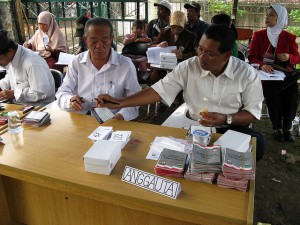On July 22nd the final results of Indonesia’s election were announced; the country’s third democratic election and the conclusion to a long, aggressive and dirty presidential race. There were two candidates (the first time there have been fewer than three); Prabowo Subianto and Joko Widowo (affectionately known as Jokowi), who were as opposite as one could hope for in a campaign race more centred on personality than policy. The international press has been firmly on Jokowi’s side for economic as well as social reasons; the West has been unified in their support because Jokowi represents the very democratic ideals we have long espoused.
Indonesia has a bloody democratic history. Prabowo himself has a dark past; his involvement in the 1988 riot has never been fully determined but suspicions range anywhere from the kidnapping and torture of political activists (13 of whom still remain ‘missing’) to the control of the riots and violence in Jakarta. These riots led to the downfall of Suharto; Indonesia’s most recent dictator and Prabowo’s father-in-law. Though various human rights groups (Kontras and the Human Rights Working Group among others) demanded he step down from his candidacy, the investigation was never reopened. The old wounds may have been left to heal during the election, but there is little hope that his ‘strongman’ life has left him; journalist Allan Nairn was threatened with arrest for exposing Prabowo’s role in the 1988 riots and Prabowo’s behaviour both on and off the campaign trail has been distinctly suspect. The smear tactics he used betrays a level of unprofessionalism and aggressive, racist nationalism; in private conversations in 1988 he claimed he would ‘drive all the Chinese out of the country even if that sets the economy back twenty or thirty years’ and his attempt to paint Jokowi as a Chinese Christian for the majority of his campaign hark back to the same prejudices. Under Prabowo, foreign media and investors alike feared the return to stronger nationalism and ‘dictatorial democracy’.
Prabowo’s lack of regard for the democratic ideals newly embraced by Indonesia is evident in his election tactics. Quick counts (historically reliable in Indonesia) had Jokowi in the lead with 52.74% against Prabowo’s 47.26% after the elections closed on July 9th. Jokowi’s PDI-P Party declared victory. Hours later, however, so did Prabowo, his acceptance speech televised on two clearly pro-Prabowo stations. Yet whilst all the pro-Jokowi quick counts showed him leading by 4 percentage points and all from respected organisations who agreed to be audited after the event, the pro-Prabowo counts all had wildly differing margins and rejected auditing. The political limbo was supposed to end on June 22nd when the official results were released but even now Prabowo refuses to concede, alleging that ‘massive, structured and systemic fraud’ had taken place (conveniently the one claim which could slow down the election process). Indonesian political limbo continues.
It is against this backdrop of political machinations and aggressive ploys that Jokowi entered. A man who grew up in the slums on the Jakartan riverbank and worked his way not only into a prestigious Indonesian university but set up his own furniture business, manufacturing and importing, before going on to be mayor of his small hometown, Solo. It was his reputation for hands on governance, delivering on his promises for on-the-ground reform, the rebuilding of roads and clearing of streets and his zero-tolerance policy towards bureaucracy and corruption that made him such a media and public darling – and brought him to a landslide victory as Governor of Jakarta. His business acumen gave him a strong sense of image, both as a candidate and for his constituency. He rebranded his city of Surakarta a hub of Javanese culture and tourism with the tagline ‘Spirit of Java’ and his image as a ‘man of the people’ has been maintained throughout, whether it be rolling up his trousers to wade through the Jakartan floods or riding his bicycle to cast his presidential vote – a stark contrast to Prabowo’s fanfare. His popularity rests on his personal integrity, a reputation which has remained despite his adroit manoeuvring of political figureheads like party boss Megawati Sukarnoputri and his own vice-president, Jusuf Kalla. Whilst this seems a yin-and-yang portrait, it is hard not to come to this conclusion, given the images and actions of the two men; whilst Prabowo is of the old guard, of the dark Indonesian past, Jokowi is the future Indonesia wishes to see for itself. We want him to win because he represents the kind of politician who ought to win.
The battle is far from over. Though Jokowi has officially won, Prabowo mounted a legal challenge and whilst it will most likely be thrown out, Prabowo will remain a vitriolic political enemy – a man who has run for President three times and refuses to give up. The political obstacles ahead are many and sizeable; if Jokowi does not start reducing fuel subsidies immediately, Indonesia is headed for economic troubles, but in his ten year tenure the incumbent President has so far failed to do so due to public unrest and political opposition. Jokowi’s small-town, mayorial style may head him for failure because his presidential duties will simply not allow this to translate. His crackdown on corruption and bureaucracy has been successful, but will he be able to do the same across the disparate and entrenched Indonesian political landscape? Throughout Jokowi’s meteoric rise to political power, a man who was a political unknown less than 5 years ago, he has been likened to an Indonesian Obama. Both were seeming outsiders and both were swept to Presidential power on a wave of ‘hope’ and ‘change’. However, the Obama metaphor can continue – if Jokowi won on the hopes of the people, he can just as easily be destroyed by them.




